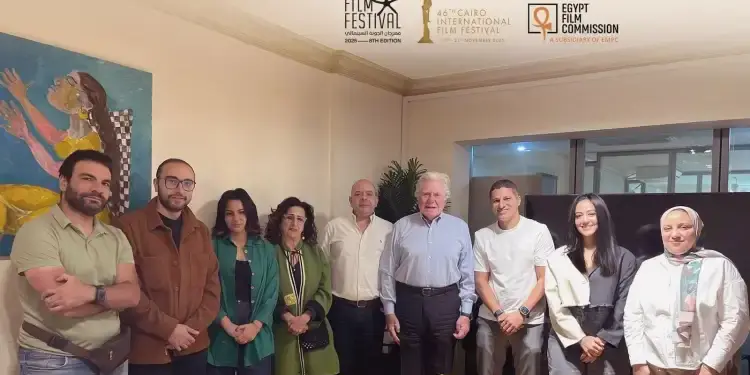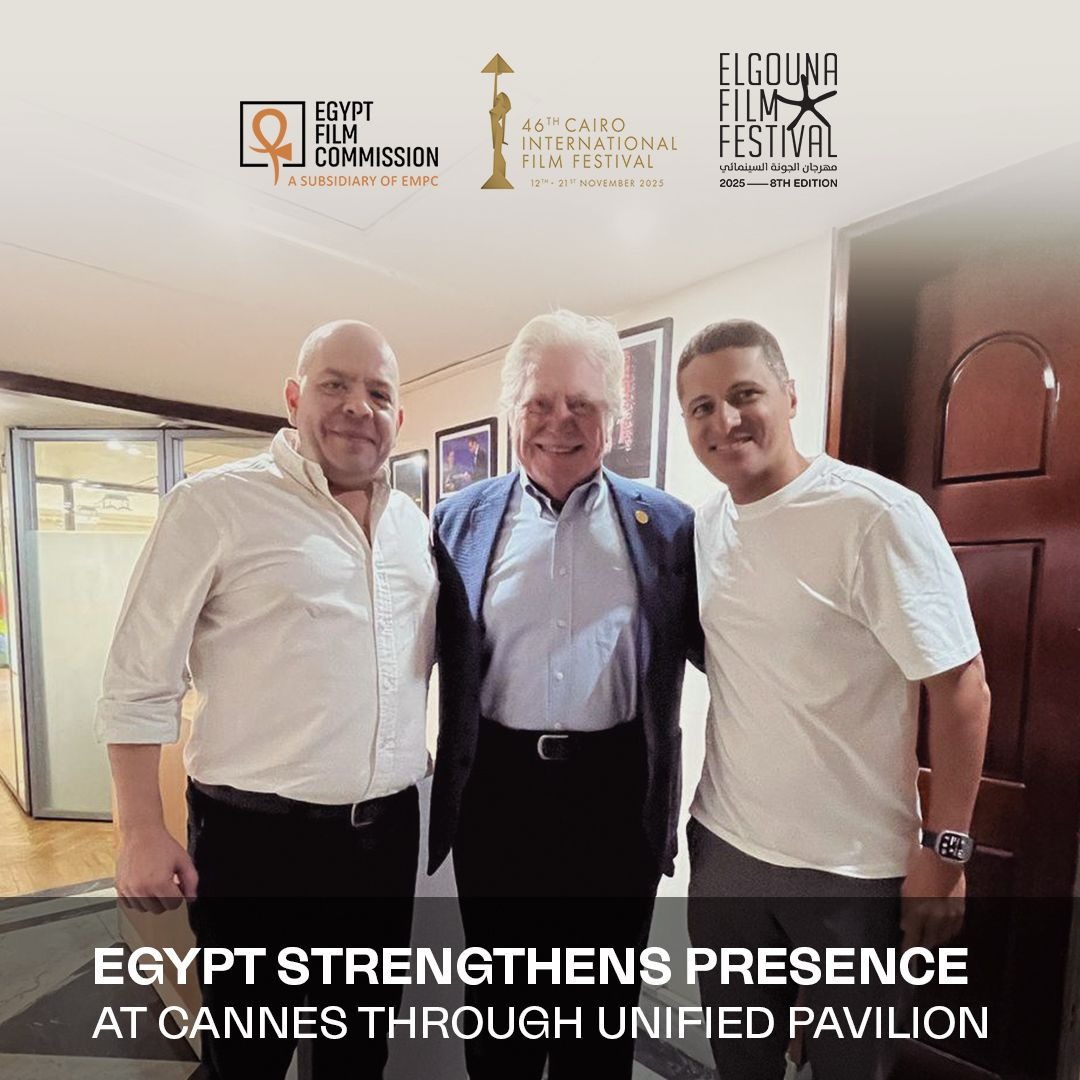This is an excellent news for the Arab world, for film enthusiasts, but also for the Cannes Film Festival itself: Egypt is making a comeback to the Cannes film market through a common national pavilion, the fruit of a collaboration between three pillars of the Egyptian cinematographic sector-the International Film Festival of Cairo (CIFF), the Festival du Film d’El Gouna (GFF). This initiative, which will take place during the 78th edition of the Cannes Festival, marks an important moment in the redefinition of the place of Egypt in the world film industry.
It should be remembered that the Cannes Film Festival is today the most prestigious cinematographic meeting in the world, both for artistic selections and for its film market, created in 1959 and become the largest in the world. According to official market data in 2024, the latter welcomed 15,000 cinema professionals from all continents: producers, distributors, programmers, buyers, institutions, journalists. Being present in Cannes is to exist on the world map of cinema.
For too long, the absence of Egyptian cinema in Cannes had something to surprise or even saddened. Because it is not a question of any cinema: Egypt has the longest and richest film tradition in the Arab world, an industry founded from the first decades of the 20th century, which produced thousands of films, shaped by generations of actors and filmmakers, and irradiated the whole region by its creativity, its diversity and its cultural influence. For decades, she was nicknamed “the Hollywood of the Nile” or “The Mother of Arab Cinema”.
And yet, this presence had been reduced in recent years, and one could only note with regret the discretion, even the absence, of Egypt in Cannes, whether in terms of films in official selection or institutional representation. This national pavilion, organized jointly by the three most influential entities in the country, therefore repaid this anomaly, and mark a strategic, concerted and ambitious return.
Looking by chance or a sign of fate, this return to the film market coincides with an exceptional year for Egyptian cinema in Cannes. For the first time in several years, Two films linked to Egypt appear in the official selections : in a certain look section, the film Aisha Can’t Fly Away Anymore The young filmmaker Morad Mostafa was selected; And in official competition, it is the Swedish director of Egyptian origin Tarik Saleh who will represent his new film The Eagles of the Republic. An artistic presence which comes to strengthen and fully justify this long -awaited institutional return.
A common pavilion to relaunch a national presence
Installed at the heart of the film market, this unified Egyptian pavilion will have several objectives: it will be a visibility space for Egyptian projects in development or production, a dialogue platform with international professionals, and especially a gathering symbol for the whole Egyptian film sector.
It will host a series of various events:
• Round tables on the future of Arab and Egyptian cinemawhere professionals who came from Egypt, from the Arab world and elsewhere will intervene to discuss the challenges of the sector, production prospects and works of circulation of works.
• Networkingin the form of informal receptions, intended to promote connections between directors, producers, distributors and international cultural institutions.
• Targeted professional discussionswhich will aim to:
- Strengthen collaboration between Egyptian and Arabian cinema festivalsin particular by setting up programming exchanges, support for distribution or cross -training.
- Support filmmakers by exploring the opportunities for co -productionsin particular by facilitating connections with European funds, producers in the South or Asian partners.
- Encourage young Egyptian talentsby offering them pitch spaces, returns on projects and concrete perspectives of collaboration with international decision -makers.
The project is not content to restore an image: it aims to strengthen concrete dynamics, in particular through support for co -productions, the valuation of emerging talents, and the promotion of Egypt as a shooting destination. With more than 60 international productions recently welcomed to its territory, Egypt also finds an attractive position in the field of shooting, which the Egyptian commission of the film, recently revitalized, intends to fully support.
The Cairo Festival, historic pillar
If this initiative is common, it is also carried with a strong conviction by the Cairo Film International Film Festival, founded in 1976 and only Festival in the Arab World and Africa recognized by FIAPF. In this new phase of influence, the CIFF intends to play a central role, not only as a showcase of Egyptian cinema, but also as a diplomatic actor of Arab cinematographic culture.
Its president, actor and filmmaker Hussein Fahmy, did not fail to underline the symbolic and strategic scope of this return:
“” We are delighted to see Egypt make a strong return to the Cannes film market through a national pavilion which brings together the two main festivals in the country, alongside the Egyptian film commission. Through this pavilion, we aim to highlight Egyptian cinema – contemporary as classic – by offering a distinguished image of Egypt after a long absence. »»
This return also involves highlighting Egyptian cinematographic heritage, one of the richest on the African continent and the Arab world, with emblematic filmmakers like Youssef Chahine, Chadi Abdel Salam, or more recently Marwan Hamed or Mohamed Diab. The pavilion will also offer discussions on the valuation of this cinematographic memory, and on the ways of better integrating this heritage in international distribution and catering circuits.
A shared ambition
The El Gouna festival, younger but already essential since its creation in 2017, brings a new energy, an openness to independent cinema, and a modern vision of the role of festivals in support for young talents. Through its Cinegouna Platform, the GFF is actively working on the development of Arab projects with high potential, and this participation in Cannes in partnership with the CIFF and the EFC translates an alignment of ambitions and a collective vision.
On the side of the Egyptian film commission, Attached to the Egyptian Media Production City, The will is clear: positioning Egypt as an international shooting destination, highlighting its landscapes, its heritage, but also its technical and human infrastructures.
This return to the Cannes film market is therefore much more than a simple stand: this is a declaration of strong intention. Egypt no longer wants to be a glorious memory of Arab cinema, it wants to be the engine again.
This common pavilion, born of a collective desire, perhaps announces a new era for Egyptian cinema. He reminds everyone that this country, which was for a long time the capital of the seventh Arab art, always has stories to tell, talents to reveal, and a major role to play on the world scene.
Neïla Driss










